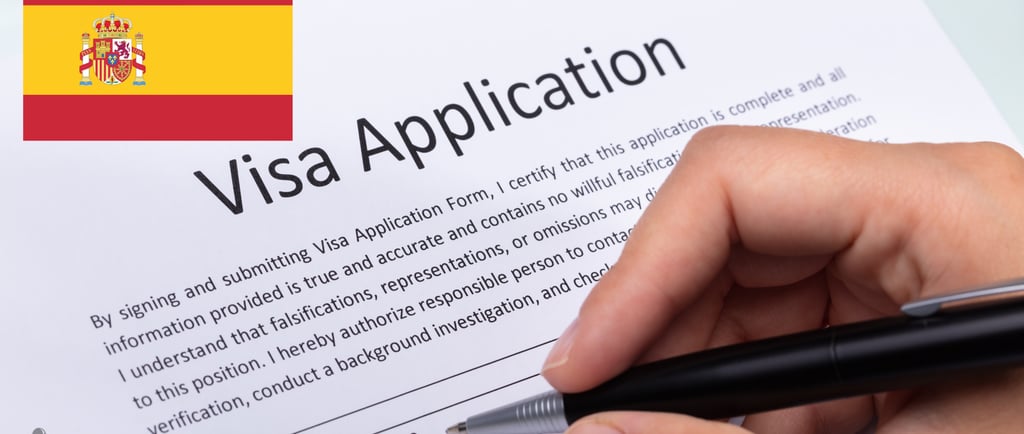Spain increased the validity of its job seeker visa for foreign workers to 1 year
Spain is rolling out some major updates to its immigration policies to better meet labor market needs and give a boost to the national economy. One of the standout changes is the extension of the job seeker visa from three months to a full year, which will kick in starting in 2025. This move is all about creating more chances for job seekers and enhancing Spain’s workforce.


Spain is rolling out some major updates to its immigration policies to better meet labor market needs and give a boost to the national economy. One of the standout changes is the extension of the job seeker visa from three months to a full year, which will kick in starting in 2025. This move is all about creating more chances for job seekers and enhancing Spain’s workforce.
Extended Job Seeker Visa Duration
With the new Immigration Law, the job seeker visa will now allow foreign nationals a whole year to hunt for job opportunities in Spain. This is a big leap from the current three-month limit, giving job seekers ample time to find positions that align with their skills and passions.
Advantages for Job Seekers and the Spanish Economy
The extension of the job seeker visa is set to offer major benefits for both foreign job seekers and Spain’s economy. With a one-year visa, foreign nationals will have a better shot at landing suitable jobs and can more easily transition to permanent residency if they get hired.
This change is likely to draw in skilled workers and help meet the demands of Spain’s labor market.
Key Benefits Include:
Longer Job Search: A full year to find the right job.
Easier Residency Transition: A smoother path from job seeker to permanent resident.
Attracting Talent: Makes Spain a more attractive destination for skilled professionals.
Economic Boost: Aims to fill labor shortages and strengthen the economy.
Regularization of Undocumented Migrants
Spain plans to regularize 300,000 undocumented migrants each year until 2027, providing residence and work permits to a total of 900,000 people. This effort is aimed at tackling labor shortages and boosting economic growth, with a focus on helping those who are already living in Spain.
How the Job Seeker Visa Works
The job seeker visa lets foreign nationals come to Spain to look for work. Once they find a job, they can go through the necessary legal steps to stay in the country. The new visa will make this process smoother, helping job seekers move from temporary to permanent residency more easily.
Spain Job Seeker Visa: Requirements and Details
The Spain Job Seeker Visa is for those looking for job opportunities in the country. Here’s what applicants should keep in mind:
Eligibility Criteria
Minimum Qualification: Applicants need to have a higher education degree or a professional qualification that matches Spain’s job market needs.
Financial Proof: They must show they have enough money to support themselves while searching for a job in Spain.
Health Insurance: Comprehensive health insurance is required to cover medical expenses during their stay.
Background Check: A clean criminal record and proof of good conduct are necessary.
No Prior Job Contract Required: This visa is for individuals who do not already have a job offer in Spain.
Documents Required
Valid Passport: A passport that is valid for at least one year.
Application Form: A completed visa application form.
Proof of Financial Means: Bank statements or other financial documents to show they have sufficient funds.
Health Insurance Policy: Valid health insurance that covers medical emergencies.
Accommodation Proof: Information about where the applicant will stay while job hunting in Spain.
Education Credentials: Copies of diplomas, degrees, or professional certificates.
Criminal Record Certificate: A background check from the applicant’s home country.
How to Apply for Spain’s Job Seeker Visa
Here’s a simple rundown of the key steps to get your hands on Spain’s Job Seeker Visa, from getting your documents ready to finally getting that visa.
Collect Your Documents: Make sure you have all the important paperwork, like proof of your qualifications, financial stability, and health insurance.
Fill Out the Application: Complete the visa application form and hand it in at the nearest Spanish consulate or embassy.
Go to an Interview: Sometimes, you might need to show up for an interview at the consulate.
Wait for Approval: Processing times can differ, so it’s smart to apply well ahead of when you plan to travel.
Head to Spain and Start Your Job Hunt: Once you get your visa, you’re all set to enter Spain and kick off your job search.
Upcoming Immigration Changes by 2025
Spain is gearing up for more immigration reforms in May 2025 to boost the workforce. These changes will focus on education, job opportunities, and family reunification, aiming to create sustainable paths for migrants while balancing economic needs with compassionate immigration policies.
